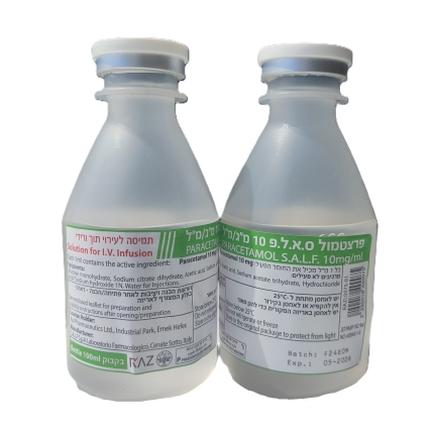Quest for the right Drug

פרצטמול ס.א.ל.פ 10 מ"ג/מ"ל PARACETAMOL S.A.L.F 10 MG/ML (PARACETAMOL)
תרופה במרשם
תרופה בסל
נרקוטיקה
ציטוטוקסיקה
צורת מתן:
תוך-ורידי : I.V
צורת מינון:
תמיסה לאינפוזיה : SOLUTION FOR INFUSION
עלון לרופא
מינוניםPosology התוויות
Indications תופעות לוואי
Adverse reactions התוויות נגד
Contraindications אינטראקציות
Interactions מינון יתר
Overdose הריון/הנקה
Pregnancy & Lactation אוכלוסיות מיוחדות
Special populations תכונות פרמקולוגיות
Pharmacological properties מידע רוקחי
Pharmaceutical particulars אזהרת שימוש
Special Warning עלון לרופא
Physicians Leaflet
Posology : מינונים
4.2 Posology and method of administration The 100 ml bottle is restricted to adults, adolescents and **Patients weighing less will require smaller volumes. children weighing more than 33 kg. The minimum interval between each administration must Posology: be at least 4 hours. The dose to be administered depends exclusively on The minimum interval between each administration in the patient`s weight. The volume to be administered patients with severe renal insufficiency must be at least 6 must not exceed the determined dose. If applicable, hours. the desired volume must be diluted in a suitable No more than 4 doses to be given in 24 hours. solution for infusion prior to administration (see section 6.6) or a syringe driver must be used. Severe renal insufficiency: It is recommended, when giving paracetamol to patients Dosing based on patient weight (please see the with severe renal impairment (creatinine clearance ≤ 30 dosing table here below) ml/min), to reduce the dose and increase the minimum interval between each administration to 6 hours (See section 5.2). Adults with hepatocellular insufficiency, chronic alcoholism, chronic malnutrition (low reserves of hepatic glutathione), dehydration: The maximum daily dose must not exceed 3000 mg (see section 4.4). Method of administration Take care when prescribing and administering PARACETAMOL S.A.L.F 10 MG/ML to avoid dosing errors due to confusion between milligram (mg) and milliliter (ml), which could result in accidental overdose and death. Take care to ensure the proper dose is communicated and dispensed. When writing prescriptions, Prolonged or frequent use is discouraged. It is include both the total dose in mg and the total dose in recommended that a suitable analgesic oral treatment volume. Take care to ensure the dose is measured and will be used as soon as this route of administration is administered accurately. possible. In order to avoid the risk of overdose, check that other Intravenous use. medicines administered do not contain either The paracetamol solution is administered as a 15-minute paracetamol or propacetamol. The dose may require intravenous infusion. adjustment (see section 4.2). PARACETAMOL S.A.L.F 10 MG/ML can be diluted in a 9 Doses higher than those recommended entail the risk mg/ml (0.9%) sodium chloride solution for infusion or of very serious liver damage. Clinical signs and 50 mg/ml (5%) glucose solution for infusion up to one symptoms of liver damage (including fulminant tenth (one volume PARACETAMOL S.A.L.F 10 MG/ML hepatitis, hepatic failure, cholestatic hepatitis, cytolytic into nine volumes diluent). In this case, use the diluted hepatitis) are usually first seen after two days of drug solution within the hour following its preparation administration with a peak seen, usually after 4 – 6 (infusion time included). days. Treatment with antidote should be given as soon as possible (See section 4.9). For instructions on dilution of the medicinal product before administration, see section 6.6. For single use only. Any unused solution should be discarded. Paracetamol should be used with caution in cases of: Before administration, the product should be visually inspected for any particulate matter and discolouration. ● hepatocellular insufficiency Only to be used if solution is clear, colorless solution or ● severe renal insufficiency (creatinine clearance ≤ 30 slightly colored from amber-yellow to pink-pale orange ml/min) (see sections 4.2 and 5.2) (perception may vary) and the container and its closure ● chronic alcoholism are undamaged. ● chronic malnutrition (low reserves of hepatic glutathione) To extract the solution, use a 0.8 mm (21 gauge) needle ● dehydration and pierce the cap vertically at the precise point ● patients suffering from a genetically caused G-6-PD indicated. deficiency (favism), the occurrence of a haemolytic anaemia is possible due to the reduced allocation As for all solutions for infusion presented in containers of glutathione following the administration of with air space inside, it should be remembered that paracetamol. close monitoring is needed notably at the end of the infusion, regardless of administration route. This Caution is advised if paracetamol is administered monitoring at the end of the infusion applies particularly concomitantly with flucloxacillin due to increased risk for central route infusions, in order to avoid air of high anion gap metabolic acidosis (HAGMA), embolism. particularly in patients with severe renal impairment, sepsis, malnutrition and other sources of glutathione

שימוש לפי פנקס קופ''ח כללית 1994
לא צוין
תאריך הכללה מקורי בסל
לא צוין
הגבלות
לא צוין
מידע נוסף
